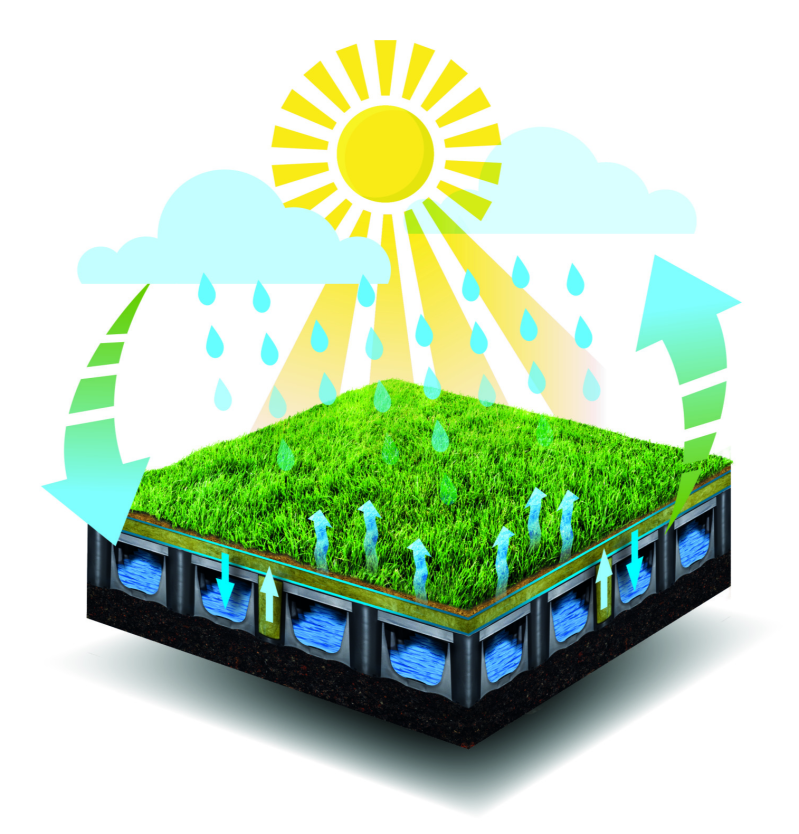Project CitySports
Project CitySports is a pilot project from the Top Consortia for Knowledge and Innovation (TKI) programme of the Water & Maritime Top Sector. The project focuses on innovations that revolve around urban cooling solutions, the circular use of (waste) material and rainwater, and safely playing sports on artificial grass pitches. The scientific study will be conducted over the next two years by KWR; Watercycle Research Institute at two locations in Amsterdam: Marineterrein Amsterdam and V.V.A Spartaan at Laan van Spartaan. For this project, KWR is working together with the following consortium partners: the City of Amsterdam, Waternet, Veolia, Drain Products Europe, DutchBlue, Marineterrein Amsterdam and the Water & Maritime Top Sector.
In the past few years, there has been significant press coverage of artificial grass pitches. Apart from the extensive use of rubber infill and its possible negative effect on the health of both athletes and the city, conventional artificial grass pitches have another unfavourable effect: they become very hot on sunny days.
This past summer, an artificial grass pitch in Leeuwarden reached temperatures of +/- 60 degrees Celsius, whereas the temperature of an adjacent natural grass pitch did not exceed 30 degrees Celsius. Although this is an extreme example, artificial grass pitches absorb much more energy from solar radiation than natural grass pitches do, which they then proceed to emit as heat. This results in uncomfortable playing conditions for athletes and contributes to the urban heat island effect; a problem cities all around the world increasingly have to deal with because of climate change.
Combined with the increase of people who want to live in cities, a new perspective on the functionality of sports pitches in urban areas is required. The City of Amsterdam currently manages over 100 artificial grass pitches. And with more periods of extreme heat like those in 2018 and 2019 as well as an expected increase in the number of short periods of heavy rainfall, it is time for smarter, innovative solutions; the reason behind TKI Project CitySports.
The new artificial grass system is innovative on all levels of its construction:
- The sub-base of the pitch consists of 85 mm high water-storing units, where rainwater is collected and stored for reuse. These units are made of 100% recycled material and contain capillary fibre cylinders that naturally transport the stored water to the shockpad.
- Apart from providing all desired sport-technical characteristics, the capillary shockpad is able to naturally transport the water to the artificial grass turf placed on top.
- The artificial grass turf contains a natural infill, from where the water eventually can evaporate. This evaporation then generates the cooling effect that allows athletes to play safely and comfortably and allows the sports pitch to contribute to cooling the city instead of warming it up.

The abovementioned innovations have created a naturally cooled artificial grass pitch, without the need for using complex water-spraying systems or energy. Furthermore, because of the collection and storage of rainwater, the city’s water problem is turned into a solution instead. In extremely hot climates where overheated artificial grass pitches are not safe to play on, sports clubs can offer their members more playing hours and a healthier environment to play sports. This improves both the wellbeing and performance of the athletes.
The two-year independent scientific study by KWR will eventually prove how much extra playing comfort the new system generates and to what extent the cooling effect of this artificial grass pitch matches the functionality of a natural grass pitch. Project CitySports contains two research areas: an operational training pitch (1,400 m2) at V.V.A. Spartaan at the Laan van Spartaan, and four smaller sensor-equipped test pitches at the Marineterrein Amsterdam that are part of their Living Labs research location (building 027A).
The multi-year project (2018-2021) has been divided into four phases
- A literature review on the overheating of artificial grass pitches and market research into artificial grass turf and possible infill materials.
- A laboratory study on capillary water transportation in the new system and evaporation with different types of artificial grass and infill materials.
- A comparative study of different types of artificial grass and infill material, the comparison with natural grass in the Living Labs of Marineterrein Amsterdam, and a full-scale study of the sports pitch at V.V.A. Spartaan.
- Publication of the results, upscaling technology into the artificial turf sports industry.